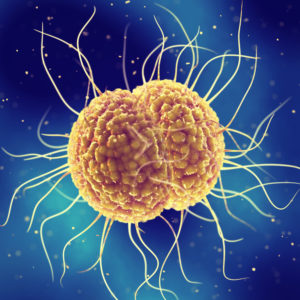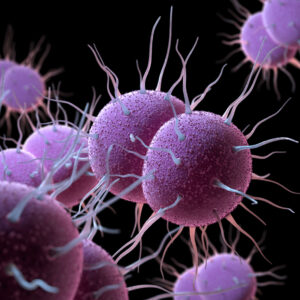Neisseria gonorrhoeae
Gonorrhoea is the second most common bacterial sexually-transmitted infection in the UK, after chlamydia. In 2017, more than 44,500 people were diagnosed with gonorrhoea in England, with most cases affecting young men and women under the age of 25.
The Native Antigen Company develop and manufacture preparations of N. gonorrhoeae antigen as controls for diagnostic assays.
Neisseria gonorrhoeae Background
Neisseria gonorrhoeae (NG) is a gram-negative diplococcus. It is an obligate human pathogen that infects urogenital epithelia, causing the sexually transmitted disease gonorrhoea. N. gonorrhoeae infects both men and women and is primarily transmitted through close sexual contact with an infected individual. N. gonorrhoeae can also be transmitted to neonates, born to infected mothers, during delivery.
Approximately 78 million people contract N. gonorrhoeae infection each year and cases are reported to be increasing (WHO). The common sites for gonococcal infection are the urethra in men and the uterine cervix in women. However, anal and oral sex can also cause infection in the anus and throat. Gonorrhoea is often described as an uncomplicated disease, which is asymptomatic in most females and some males. If left undiagnosed and untreated, infection in women may affect the upper genital tract causing pelvic inflammatory disease and fertility problems. Neonates infected with N. gonorrhoeae can develop rhinitis, vaginitis or urethritis. In severe cases, infected infants may develop ophthalmia neonatorum, a form of conjunctivitis, and sepsis (CDC).
Although Leistikow and Löffler first cultivated the gonococcus in 1882, N. gonorrhoeae is an ancient disease that has, in recent years, been treated successfully with antibiotics. However, N. gonorrhoeae is now reported to be resistant to most antibiotics, with the exception of cephalosporin and is becoming a major global health concern (Unemoa, M.).
References
- World Health Organization: Antibiotic resistant gonorrhoea on the rise, new drugs needed
- Centres for Disease Control and Prevention: Gonoccocal infections
- Unemoa, M and Shafer, W.M. (2014). Antimicrobial Resistance in Neisseria gonorrhoeae in the 21st Century: Past, Evolution, and Future. Clin Microbiol Rev. Jul; 27(3): 587–613
Neisseria gonorrhoeae Antigens
We prepare Neisseria antigen from a preparation of whole bacteria cultured in vitro, followed by homogenisation and sonication. This produces an antigen preparation especially well-suited for use in immunoassays.
Questions?
Check out our FAQ section for answers to the most frequently asked questions about our website and company.


